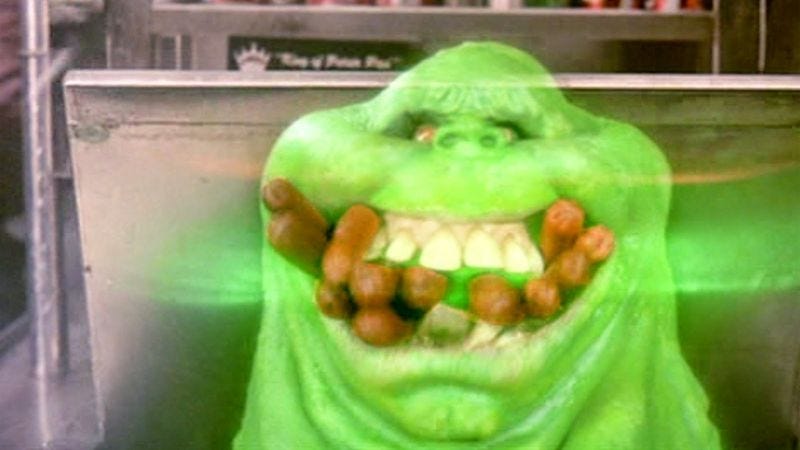This seems like a fairly straightforward thing to talk about, doesn't it? A little detail, Jesus ate some fish, no problem there. But thinking about who the disciples thought Jesus was when he returned from the dead and who he actually is, well, it got me thinking about some famous movie ghosts who occupy different sides of the eating conundrum. Here's a clip from Ghostbusters. You know, the good one.
That's captain Barbossa giving a much more realistic view of ghosts and food. Not that you can eat whatever you want and never gain weight, but rather that you can't eat anymore, because you're insubstantial. You don't have a body, flesh and blood, you're a ghost, and ghosts don't eat. Ghosts lack things like tastebuds, tummies, and intestines with which to digest. They're dead, they're all messed up..
And this is why Jesus eating fish is as important as it is. When the disciples see Jesus, they get concerned, they get perplexed, worried, and say 'it is a ghost!' Sure, that's a realistic conclusion, based on every single fact that any of us have ever known, which is that dead people have no motivation, and they don't do anything. They just lie there, and they sure don't come back into your house and ask for catering. But Jesus did. Saying not only 'see my hands and my feet,' but also 'do you have anything to eat?' So they gave him a piece of broiled fish, and he ate it in their presence.
Now, you do need to think about what you believe in as a Christian, and what that actually means. For an essential, core belief that we have as Christians, which comes up in the creed, is that we believe in the Holy Spirit, the Holy Christian church, the commuion of saints, the forgiveness of sins, the resurrection of the body, and the life everlasting. Etc. The resurrection of the body is key, it is absolutely key to all of this, and you know this from your daily life. It's one thing to treat death in the way the average western human does, to say of your dearly departed individuals that they are always with you in your dreams, that they are ghosts or spirits, that they are memories and so on, but those things are ephemeral, and don't really say anything of any real value. Nothing with the actual weight and importance, with the heft and stature of Jesus Christ of Nazareth.
He isn't a ghost, he isn't a spectre or a spirit, he's not a wandering sheet, or anything insubstantial, he's a real human being. He takes up space, he walks and talks, he eats and breathes, which he does in the presence of his disciples. He's not a ghost, which is something that has all the form of a person but none of the substance. He's both. And if you think of your loved one who have died in the faith, do you want them to be a spectre or a ghost? Do you want them to be insubstantial and incorporeal? For the pirates in the first pirates of the Caribbean movie, they were torn between two existences, which was that one the one side, they would be everlasting, but as everlasting creatures, they could not enjoy anything on earth; food or drink, sunshine or relationships, the curse was a waking hell for it was forever yet all they wanted was for it to end. If you have a loved one, or even you yourself, and you're thinking about life in the world to come, do you want to be insubstantial, or do you want to be substantial? Do you want to be corporeal, or do you want to be incorporeal? Do you want to be able to see and associate with, and to love your family, or do you want to be swatting at ghosts forever?
The resurrection of the body, as part of the creed, is actually one of the most important parts of it as far as what we are hoping for, and Jesus manifested that brilliantly in that room, and as usual, it comes down to an order of fish.


No comments:
Post a Comment